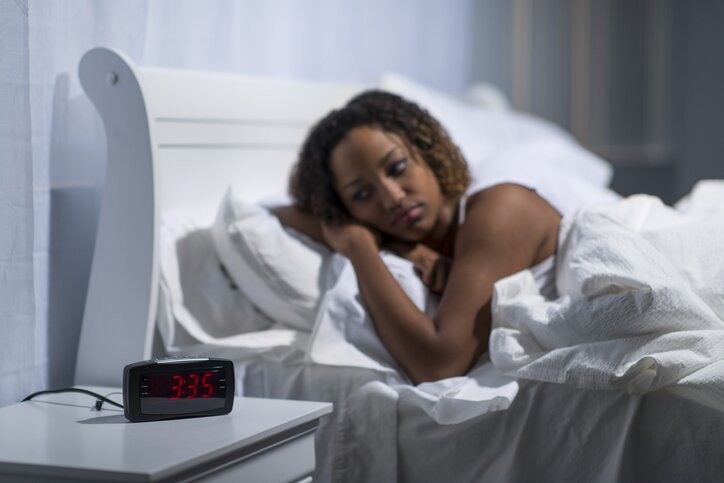If You Can’t Sleep, These Seven Surprising Culprits Might Be to Blame
Do you find yourself lying awake in bed or tossing and turning all night? If you can’t sleep, these sneaky slumber thieves could be the cause.
Sleep disorders affect an estimated 33% of Americans. It’s something we can all relate to at least occasionally and for some, it’s a chronic problem. There are many well-known causes of insomnia, as well as some you might not be aware of.
If you can’t sleep, please read on to discover some surprising possible causes along with helpful tips to get more shuteye.

1: Your bedroom temperature
A toasty bedroom might feel cozy but it’s not ideal if you're struggling with insomnia. According to the Sleep Foundation, warmer temperatures in the bedroom can lead to restlessness and discomfort. Sleeping in an overly warm bedroom causes fatigue because it interferes with the body's thermoregulation abilities, forcing you to remain in the lighter stages of sleep. A cold bedroom doesn't always lead to a night of deep sleep, either. If your bedroom is too chilly, you’ll need to bundle up and that may lead to overheating later on in the night. It could also leave you shivering. Bedroom temperatures between 63 and 68 degrees are ideal for a night of restful sleep.
2: Your mint-flavored toothpaste
Having minty fresh breath before bed feels nice and invigorating. Unfortunately, that peppermint toothpaste might be the reason you're having a hard time falling asleep at night. Peppermint stimulates the brain due to its high menthol content, which isn’t what you want when you’re trying to calm your mind for sleep. Mint toothpaste might be the standard, but there are many alternative flavors on the market such as cinnamon and berry.
3: Exercising too close to bedtime
It turns out that the time of day you exercise can really have a negative impact on your shuteye. Exercise ramps up the heart rate and hormonal system. Vigorous exercise releases adrenalin and the stress hormone cortisol, which are both counterproductive to slumber. Harvard Health Publishing recommends avoiding exercise at night. If you must have an evening workout, make sure it’s at least three hours before bedtime to give your body time to slow down and relax.
4: Skimping on your exercise
If you're not moving your body enough on a regular basis, it’s probably contributing to your insomnia. Exercise during the day is vital if you want to fall asleep and stay asleep. It improves the core temperature, relieves anxiety and depression, and realigns the internal body clock. According to research from Johns Hopkins, 30 minutes of daily exercise is enough to improve sleep. Just be sure to exercise well before bedtime, as mentioned above.
5: An upcoming event is weighing on your mind
You have an important interview, doctor’s appointment, or you are due to appear in court. These are just a few examples of upcoming events that might cause anxiety. Psychology Today describes the connection between sleep loss and anxiety as being a vicious cycle. Not getting enough sleep leads to anxiety; having anxiety leads to the inability to fall asleep. If you're struggling with anxiety at bedtime, it’s important to know that it can be overcome. Journaling, talk therapy, meditation, prayer, and anti-anxiety medications are just a few of the many options out there.
6: Too many sugary treats
It’s bedtime but the cookies, cake, and donuts are calling your name. For those who struggle with insomnia, avoiding those sugary desserts and refined carbs is an absolute must. Research published in the Journal of Clinical Sleep Medicine shows that people who have sugary diets tend to sleep less deeply than others who avoid it. These high-glycemic diets trigger an inflammatory response in the body and create imbalances in intestinal bacteria. If you’re craving something sweet before bedtime, choose a cup of Greek yogurt or a small handful of granola.
7: You took a long nap late in the day
Napping during the day can be tempting, but it can really derail your sleep. The Mayo Clinic says that while short naps early in the day don't necessarily impact sleep patterns, lengthy naps can wreak havoc, especially when they’re later in the day. A 15-minute catnap at noon won't ruin your night, but a three-hour snooze at dinnertime probably will. If you can’t fit a quick siesta in before 2 PM, it's best to save your sleepiness for bedtime.
If you can’t sleep, you are not alone. Insomnia is a common problem but there are plenty of steps you can take to improve your shuteye. If you have questions or need additional resources, we are here to help. Please contact us anytime.
About Batchelor Brothers Funeral Services: As a leading African American-owned and operated funeral and cremation organization, Batchelor Brothers Funeral Services has provided a ministry of care to thousands of grieving families. We promise to provide our highest level of distinguished service and respect to families who entrust us to honor their loved ones. With two convenient locations serving North and West Philadelphia, it is always our pleasure to be of service. For more information about our funeral, cremation, memorial, repast, and grief counseling services, please visit batchelorbrothers.com.







Comments